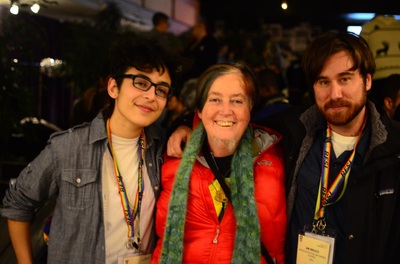A (No Longer) Quiet Revolution: Intersex Awareness Day
(First appeared in The Bilerico Project, October 26, 2012)
October 26 is widely recognized as Intersex Awareness Day. This day marks our calendars because one of the first intersex advocacy groups Intersex Society of North America (ISNA) (under the banner of ISNA's first direct action group: "Hermaphrodites With Attitude") partnered with transgender advocates, Transexual Menace, to picket the American Academy of Pediatrics annual conference in Boston on October 26th, 1996. The picketers were angry that doctors attending the conference continued to recommend normalizing cosmetic surgeries on the genitals of healthy intersex kids. Many adults protesting had been subjected to these same damaging and irreversible surgeries as infants.
As brave as these individuals were, their appeals for reason and restraint went largely unheard by the medical community that day. Medical policymakers thought then - and many believe today - that these protesters were unfortunate souls who experienced "older methods" and that "surgical procedures are better" and "overall patient treatment is vastly improved."
That was then, this is now, and things have changed.
Today, Advocates for Informed Choice (AIC) proudly announces the landmark publication of What We Wish Our Doctors Knew written and produced by Inter/Act, the first intersex youth leadership development program in existence.
Inter/Act is a space for young people with intersex conditions or DSDs (differences of sex development) to come together from all over the world to express themselves, uniting their individual stories to develop a voice for a new generation. Inter/Act was created to help mold tomorrow's intersex advocates with the goal of creating greater understanding among peers, parents, doctors, scholars, and supporters about the varied experiences and perspectives of young people with different bodies.
Now, for the first time, young people born with intersex traits have a platform. This program helps them to speak directly to their doctors about how they experience treatment. Inter/Act allows young people a safe place to voice the complicated emotions that can come with being born with an intersex condition. These young people can safely express their concerns, fear, hope and anger - something the protesters in Boston were unable to do.
For these reasons alone What We Wish Our Doctors Knew is revolutionary. AIC and Inter/Act believe this document will serve to advance the dialogue between young people, parents, medical providers and activists, and we're sharing it with you. Please pass it on!
I hope you enjoyed this unique introduction to October 26, and its decorated history of intersex activism. ©
As brave as these individuals were, their appeals for reason and restraint went largely unheard by the medical community that day. Medical policymakers thought then - and many believe today - that these protesters were unfortunate souls who experienced "older methods" and that "surgical procedures are better" and "overall patient treatment is vastly improved."
That was then, this is now, and things have changed.
Today, Advocates for Informed Choice (AIC) proudly announces the landmark publication of What We Wish Our Doctors Knew written and produced by Inter/Act, the first intersex youth leadership development program in existence.
Inter/Act is a space for young people with intersex conditions or DSDs (differences of sex development) to come together from all over the world to express themselves, uniting their individual stories to develop a voice for a new generation. Inter/Act was created to help mold tomorrow's intersex advocates with the goal of creating greater understanding among peers, parents, doctors, scholars, and supporters about the varied experiences and perspectives of young people with different bodies.
Now, for the first time, young people born with intersex traits have a platform. This program helps them to speak directly to their doctors about how they experience treatment. Inter/Act allows young people a safe place to voice the complicated emotions that can come with being born with an intersex condition. These young people can safely express their concerns, fear, hope and anger - something the protesters in Boston were unable to do.
For these reasons alone What We Wish Our Doctors Knew is revolutionary. AIC and Inter/Act believe this document will serve to advance the dialogue between young people, parents, medical providers and activists, and we're sharing it with you. Please pass it on!
I hope you enjoyed this unique introduction to October 26, and its decorated history of intersex activism. ©

